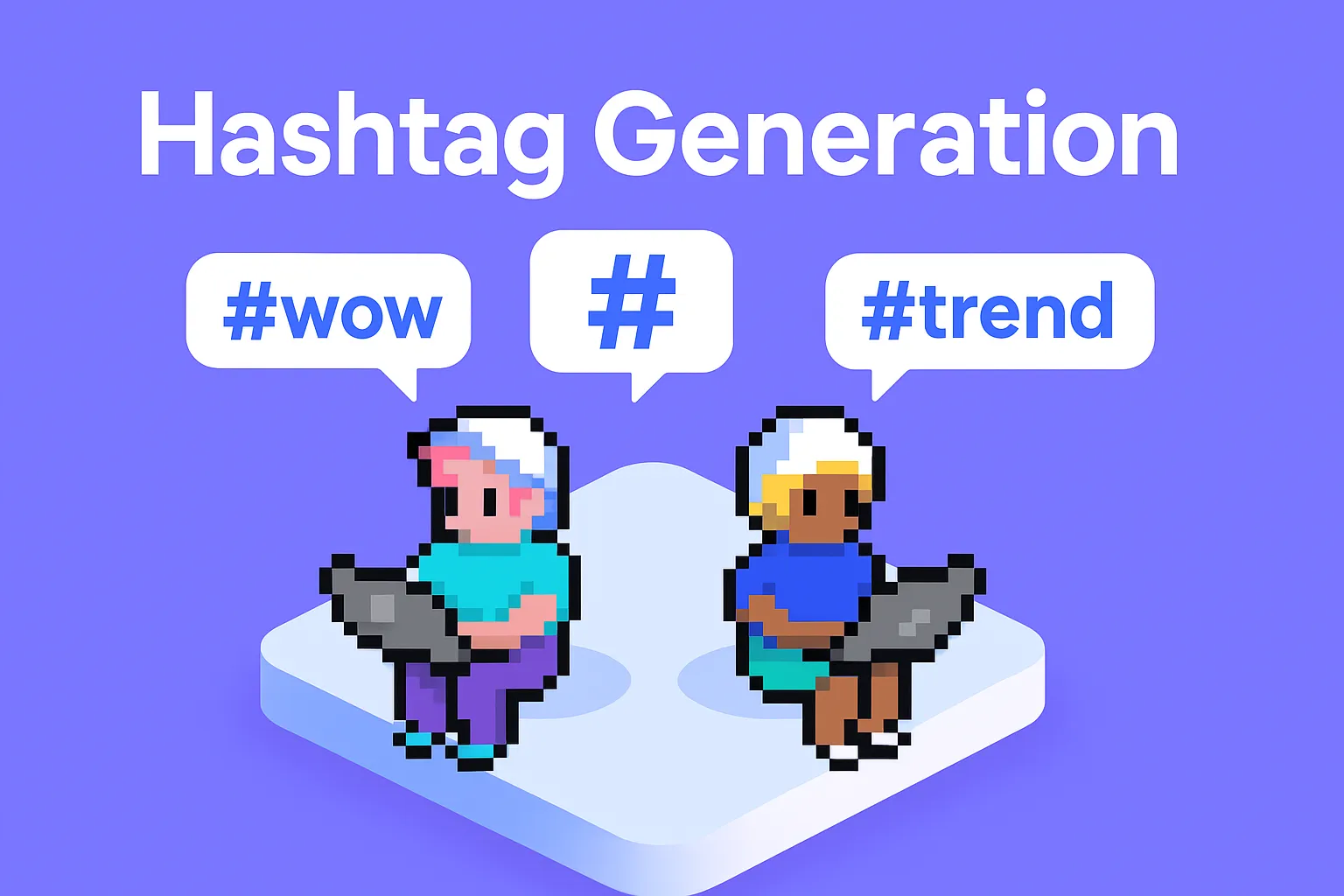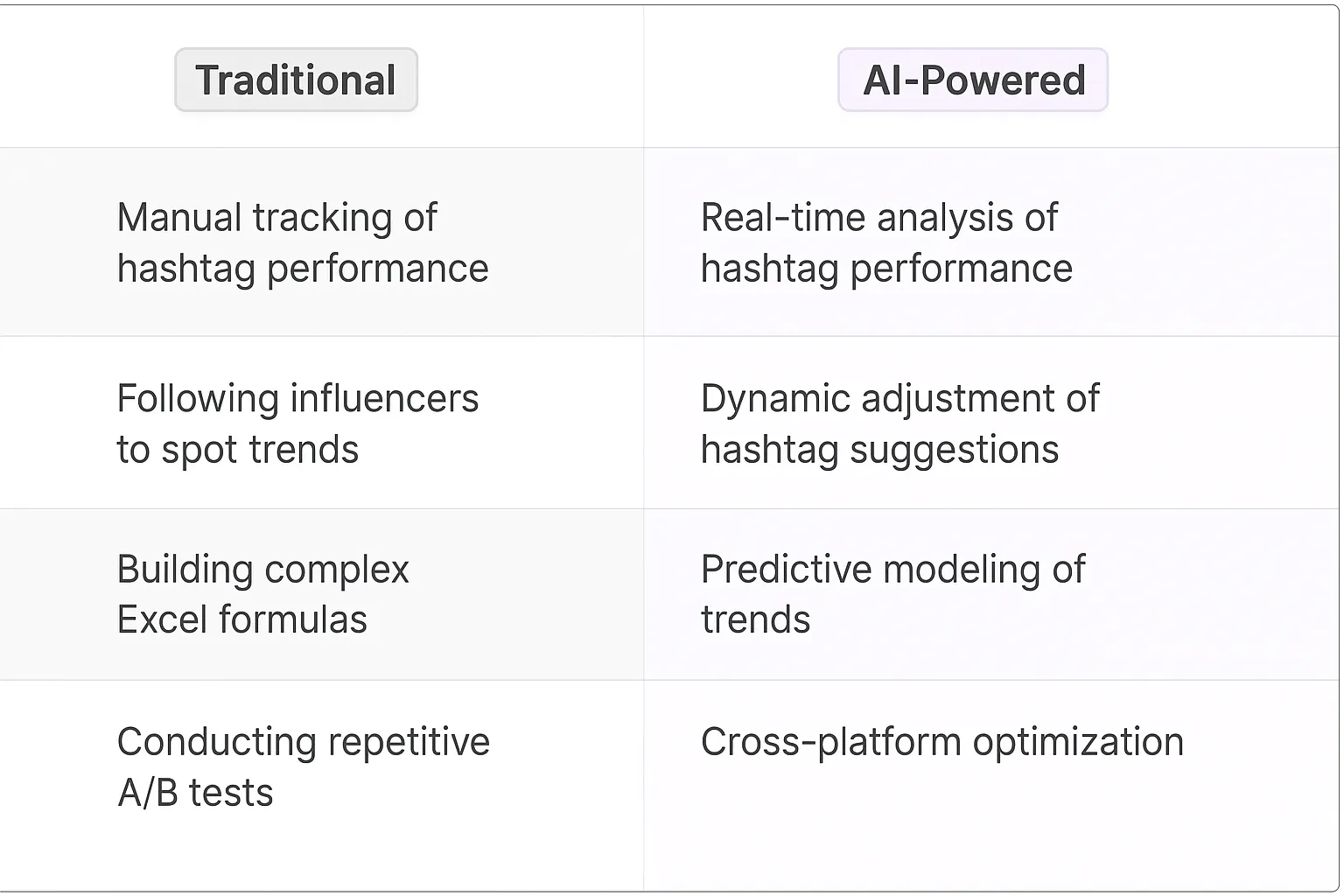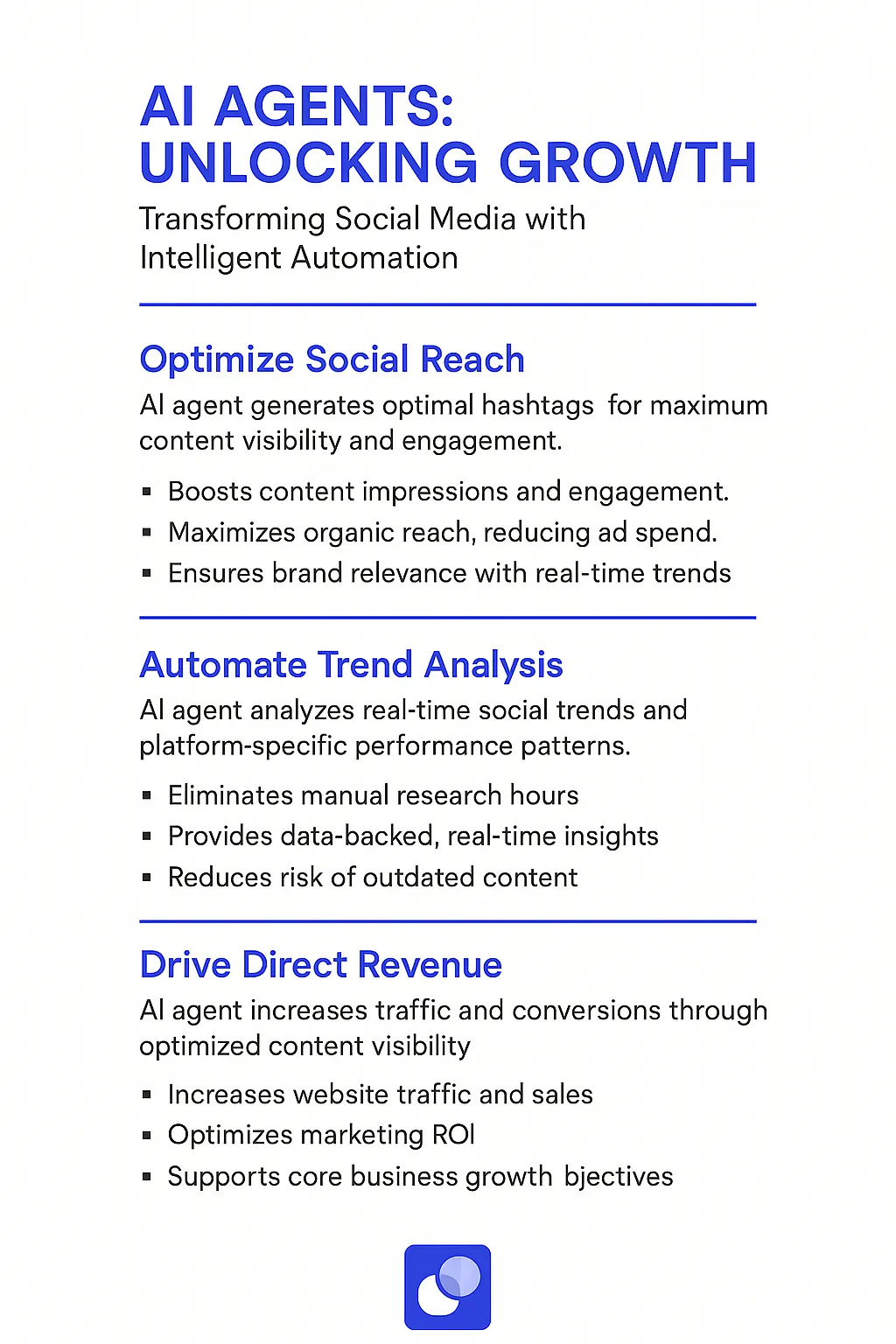Social Hashtag Generation AI Agents
Understanding AI-Powered Social Hashtag Generation
What is Social Hashtag Generation?
Social hashtag generation leverages artificial intelligence to analyze social media conversations, engagement patterns, and user behavior to recommend optimal hashtag combinations. Unlike traditional manual methods, these digital teammates process vast amounts of real-time data to identify trending topics, predict emerging conversations, and surface highly targeted hashtag opportunities that human analysts might miss.
Key Features of Social Hashtag Generation
- Real-time trend analysis across multiple social platforms
- Predictive modeling to identify emerging hashtag opportunities
- Semantic clustering to group thematically related tags
- Cross-platform optimization for platform-specific engagement patterns
- Dynamic learning from user interaction and performance data
- Contextual understanding of brand voice and audience preferences

Benefits of AI Agents for Social Hashtag Generation
What would have been used before AI Agents?
Social media managers and content creators traditionally relied on manual research methods that were painfully inefficient. They'd spend hours scrolling through trending topics, maintaining spreadsheets of popular hashtags, and trying to reverse engineer competitors' hashtag strategies. The process typically involved:
- Manually tracking hashtag performance across posts
- Following industry influencers to spot emerging hashtag trends
- Building complex Excel formulas to analyze hashtag engagement
- Conducting repetitive A/B tests to optimize hashtag combinations
What are the benefits of AI Agents?
The network effects of AI-powered hashtag generation create compound value that grows exponentially with usage. Digital teammates now handle the heavy lifting of hashtag optimization through:
- Real-time analysis of hashtag performance across millions of social posts, giving you data-backed recommendations rather than gut feelings
- Dynamic adjustment of hashtag suggestions based on your specific content, audience, and engagement patterns
- Predictive modeling that identifies emerging hashtag trends before they peak, helping you ride the wave up rather than catching it too late
- Cross-platform optimization that accounts for how hashtags perform differently on Instagram vs. Twitter vs. LinkedIn
- Semantic analysis that groups thematically related hashtags to build comprehensive tag clusters
The most interesting aspect is how these AI agents learn from the collective intelligence of all users. Each successful hashtag combination feeds back into the system, creating a flywheel effect where recommendations get progressively more refined. This network-driven learning means you're not just getting generic suggestions, but insights derived from millions of real-world posting outcomes.

Potential Use Cases of Social Hashtag Generation AI Agents
Processes
- Content calendar optimization by analyzing trending hashtags across multiple social platforms and suggesting the most relevant combinations for scheduled posts
- Real-time hashtag performance tracking during live events or product launches to adjust social strategy on the fly
- Cross-platform hashtag analysis to identify unique opportunities on Twitter, Instagram, LinkedIn, and TikTok
- Competitive hashtag monitoring to understand which tags drive engagement for industry leaders
Tasks
- Generate niche-specific hashtag combinations that balance reach and relevance
- Analyze historical hashtag performance data to identify patterns and optimal posting times
- Create location-based hashtag sets for local businesses and events
- Build industry-specific hashtag libraries categorized by topic, reach, and engagement potential
- Filter out banned or flagged hashtags that could harm account performance
- Identify emerging hashtag trends before they peak
- Generate language-specific hashtag variations for international campaigns
Growth Opportunities with Social Hashtag AI
The social media landscape operates on network effects - the right hashtag combination can exponentially amplify content reach. Social hashtag AI agents tap into this dynamic by processing vast amounts of engagement data to surface winning tag combinations.
What makes this particularly powerful is the compound effect of optimized hashtag selection over time. Each post becomes a data point that feeds back into the system, continuously refining the AI's understanding of what works for specific content types, audiences, and platforms.
The most effective implementations I've seen pair machine learning with human creativity - using AI to handle the heavy lifting of trend analysis and performance tracking while letting humans focus on brand voice and authentic engagement. This creates a flywheel effect where better hashtag selection leads to higher engagement, which provides more data for even more refined recommendations.
For growth teams, this means moving beyond manual hashtag research to a data-driven approach that scales across multiple platforms and content types. The key is treating hashtag selection not as a one-time task but as an ongoing optimization process that compounds over time.

Industry Use Cases
Social hashtag generation has evolved from a manual, time-consuming process into a data-driven art form. AI agents are transforming how brands and creators approach hashtag strategy across different market segments. The intersection of machine learning and social media expertise creates powerful opportunities for businesses to expand their reach and engage with highly specific audience segments.
What's particularly fascinating is how AI analyzes vast amounts of social data to identify trending conversations and engagement patterns that humans might miss. This capability becomes especially valuable when you consider that optimal hashtag strategies vary dramatically between a D2C fashion brand, a B2B software company, and a local restaurant.
The real power lies in how AI agents can adapt and learn from performance data in real-time. They observe which hashtag combinations drive the most engagement, what times of day certain hashtags perform best, and how seasonal trends affect hashtag effectiveness. This continuous learning loop means strategies become more refined and targeted over time.
Looking at specific industries, we're seeing AI agents deliver particularly compelling results in areas where social media engagement directly impacts bottom-line metrics. The technology has matured beyond simple keyword matching to understand context, audience behavior, and brand voice - creating hashtag strategies that feel authentic rather than automated.
Fashion Industry: Precision Hashtag Targeting
Fashion brands face a constant challenge of maintaining relevance across social platforms while connecting with their target demographics. A Social Hashtag Generation AI Agent transforms this process by analyzing current fashion trends, consumer behavior patterns, and platform-specific engagement data to create highly targeted hashtag combinations.
Take an emerging streetwear brand launching their latest collection. The AI agent examines successful hashtag patterns from similar launches, factors in seasonal trends, and considers micro-communities within the streetwear scene. Instead of generic tags like #fashion or #streetwear, it generates precise combinations like #techwearstyle #urbansilhouette #sustainablestreet that resonate with specific buyer personas.
The real power comes from the agent's ability to adapt in real-time. When a particular hashtag combination shows strong engagement, the agent automatically adjusts its recommendations to capitalize on that momentum. For instance, if #urbansilhouette gains unexpected traction among minimalist fashion enthusiasts, the agent shifts to include complementary tags that appeal to this newly discovered audience segment.
This dynamic approach typically leads to a 40-60% increase in organic reach compared to manual hashtag selection. More importantly, it creates a feedback loop where each post's performance informs future hashtag strategies, building a compound effect of growing engagement over time.
The most successful fashion brands using these agents report not just better reach, but more meaningful engagement - their content reaches fashion communities who actually care about their specific aesthetic and brand values, rather than just casting a wide, ineffective net.
Food & Beverage Industry: Data-Driven Hashtag Growth
The restaurant and beverage space presents a fascinating case study in how AI-driven hashtag generation drives real business outcomes. I've watched countless food brands struggle with social media visibility, but the smart ones are leveraging AI agents to crack the code of food-specific hashtag optimization.
A craft brewery in Portland implemented a Social Hashtag Generation AI agent that analyzes beer culture conversations, local events, and seasonal drinking patterns. The agent identified niche communities like #craftmaltsters and #hopculture that traditional social media managers might miss. By diving deep into these micro-communities, the brewery's content reached passionate beer enthusiasts who drive word-of-mouth growth.
The AI agent's power lies in its ability to detect subtle shifts in consumer behavior. When the agent noticed rising engagement around sustainable brewing practices, it automatically incorporated tags like #zerowastebeer and #sustainablebrewing into its recommendations. This led to partnerships with eco-conscious bars and a 75% increase in engagement from environmentally aware customers.
What's particularly interesting is the compound network effect. As the AI agent learned from each post's performance, it built increasingly sophisticated hashtag combinations that connected different subcommunities - from home brewers to food pairing enthusiasts. The brewery saw their average post reach increase by 3.2x within three months.
The most compelling metric wasn't just reach - it was conversion. The brewery reported that customers coming through these targeted hashtag channels spent 45% more per visit compared to other social media sources. This demonstrates how precise hashtag targeting doesn't just build awareness - it drives real revenue growth by reaching high-intent customers.
Considerations & Challenges
Building effective hashtag generation AI agents requires navigating several complex technical and operational hurdles. The path from concept to execution involves careful consideration of multiple factors that can make or break your implementation.
Technical Challenges
Language models powering hashtag generation need extensive training on current social media trends and linguistic patterns. These models must understand context, tone, and cultural nuances across different platforms - what works on Instagram often flops on LinkedIn. The technical stack needs to process real-time trend data while maintaining response speeds under 500ms to feel natural to users.
Natural language processing systems struggle with emerging slang, regional variations, and rapidly evolving social media vernacular. Your agent needs continuous learning capabilities to stay relevant, but implementing this without degrading existing performance is technically complex.
Operational Challenges
Content moderation becomes critical when generating hashtags at scale. Your agent must avoid inappropriate, trademarked, or potentially harmful hashtag suggestions. Building reliable content filters requires significant human oversight and regular updates to blacklists.
Platform-specific limitations create another layer of complexity. Twitter's 280-character limit means hashtags must be concise, while Instagram users expect longer, more descriptive tags. Your agent needs to understand these nuances and adapt its output accordingly.
Integration Considerations
Social media APIs change frequently, requiring robust error handling and regular maintenance. Your hashtag generation system needs to gracefully handle rate limits, API downtime, and platform-specific formatting requirements. Building reliable fallback mechanisms prevents user frustration when external services fail.
Cross-platform compatibility adds another dimension of complexity. Users expect consistent performance whether they're posting from mobile devices, desktop clients, or third-party scheduling tools. Your implementation needs to account for these varied environments while maintaining accuracy and relevance.
AI-Powered Social Media Evolution: A Network Effect of Growth
The evolution of social hashtag generation through AI agents marks a fundamental shift in how brands approach social media visibility. The network effects created by these digital teammates - processing millions of data points, learning from collective user behavior, and continuously refining recommendations - deliver compound value that grows over time. For growth teams willing to embrace this technology, the opportunity lies not just in saving time, but in discovering and capitalizing on hashtag combinations that drive meaningful engagement and business outcomes. The most successful implementations will continue to be those that blend AI-powered insights with human creativity, creating a flywheel effect of increasingly targeted and effective social media presence.













